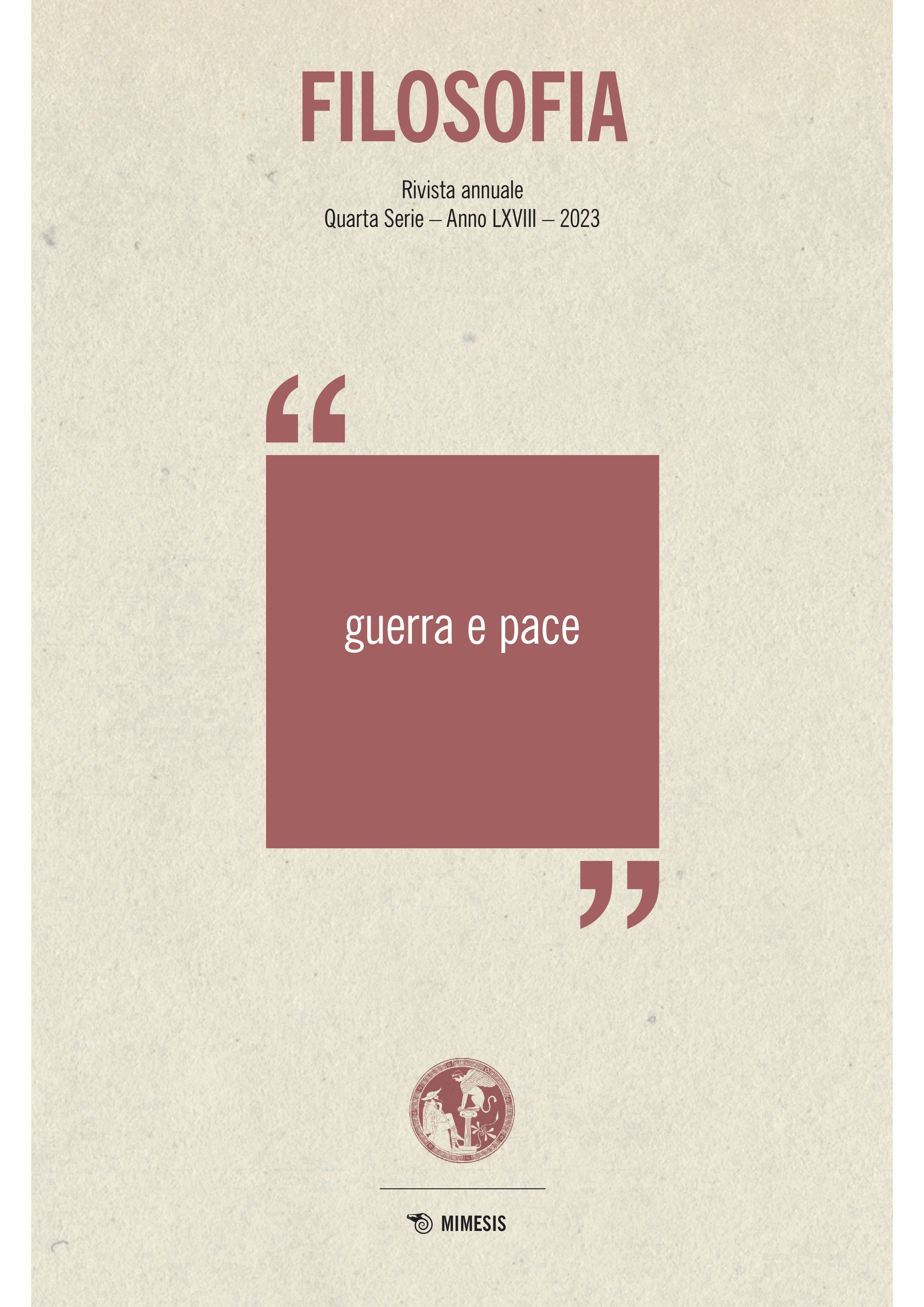The "Upside-Down World". Sketch of a Political-Phenomenological Theory of the Escape
DOI:
https://doi.org/10.13135/2704-8195/9227Keywords:
structures of escaping, phenomenology, spatial theory, political philosophyAbstract
The discourse on escaping is primarily directed towards the who of escape. The question of how of escaping in its philosophical significance is normally neglected. For this purpose, it is necessary to rethink escape as a triple articulated phenomenological topology based on three vectors: escape as a start, as a transition and as a destination / refuge. By examining its political and spatial-philosophical characteristics (escape as a separation, as a non-place and as a fugue) as well its topological dimensions (earth as exile, see and desert, earth as asylum), escape emerges as a dynamic phenomenon that is due to reshape essential concepts and inverse traditional categories of politics.
Downloads
References
Agamben, Giorgio. 1995. Homo sacer. Il potere sovrano e la nuda vita. Torino: Einaudi.
Agamben, Giorgio. 1996. Mezzi senza fine. Note sulla politica. Torino: Bollati Boringhieri.
Augé, Marc. 2009. Nonluoghi. Introduzione a un’antropologia della surmodernità. Tr. it. Dominique Roland, Carlo Milani. Milano: Elèuthera.
Bollnow, Otto. 2010. Mensch und Raum. Stuttgart: Kohlhammer. Brecht, Bertolt. 1961. “Pensieri sulla durata dell’esilio” in Poesie e canzoni. Tr. it. Ruth Leiser, Franco Fortini. Torino: Einaudi.
Cacciari, Massimo. 1995. Migranten. Vienna: Merve.
Cacucci, Pino. 2008. Un po’ per amore, un po’ per rabbia. Milano: Feltrinelli.
Cassano, Franco. 1995. Il Pensiero meridiano. Bari: Laterza.
Cortelazzo, Manlio, e Michele Cortelazzo. 1999. DELI – Dizionario etimologico della lingua italiana. Bologna: Zanichelli.
Deleuze, Gilles, e Félix Guattari. 1980. “Rizoma”, in Mille piani. Roma: Castelvecchi.
Derrida, Jacques. 2020. Politiche dell’amicizia. Milano: Raffaello Cortina Editore.
Eberhard, Johann August. 1803. Synonymisches Handwörterbuch der deutschen Sprache. Halle: Schimmelpfennig.
Esposito, Roberto. 2002. Immunitas. Protezione e negazione e della vita. Torino: Einaudi.
Frontino, Sesto Giulio. 1990. Strategemata. Leipzig: Teubner.
Grimm, Jakob, e Wilhelm Grimm. 1984. Wörterbuch des Deutschen. München: DTV.
Hegel, G. W. F. 1947. Lezioni sulla filosofia della storia. Tr. it. Guido Calogero, Corrado Fatta. Firenze: La Nuova Italia.
Heidegger, Martin. 1987a. “Che cos’è metafisica”, in Segnavia. Tr. it. Franco Volpi, 59-77. Milano: Adelphi.
Heidegger, Martin. 1987b. “Lettera sull’umanismo”, in Segnavia. Tr. it. Franco Volpi, 267-315. Milano: Adelphi.
Heidegger, Martin. 2011. Essere e tempo. Tr. it. Alfredo Marini. Milano: Mondadori.
Kerényi, Karl. 1964. “Moira” in Griechische Grundbegriffe, 53-58. Zurigo: Rhein-Verlag.
Leibfried, Erwin. 2001. “Was ist und heißt fremd?” in Flucht und Vertreibung in der deutschen Literatur, Feuchert Sascha, a cura di, 11-14. Berna: Lang.
Müller, Doren. 2010. Flucht und Asyl in europäischen Migrationsregimen. Göttingen: Universitätsverlag.
Nick, Dagmar. 2016. “Flucht” in Schattengespräche. Aachen: Rimbaud Verlag. Omero. 2009. Odissea. Tr. it. Rosa Calzecchi Onesti. Torino: Einaudi.
Pfeifer, Wolfgang. 2005. Voce “Exil” in Etymologisches Wörterbuch des Deutschen, 310. München: DTV.
Pfeifer, Wolfgang. Voce “Zuflucht” in Etymologisches Wörterbuch des Deutschen, 359. München: DTV. Rausch, Alexander. 2005. “Polyphonie” in Österreichisches Musiklexikon online, 28.1.2022,
https://www.musiklexikon.ac.at/ml/musik_P/Polyphonie.xml
Reale, Giovanni, a cura di. 2006. I frammenti dei presocratici. Milano: Bompiani.
Schmitt, Carl. 1972. Le categorie del politico. Tr. it. Gianfranco Miglio, e Pierangelo Schiera. Bologna: Il Mulino.
Simmel, Georg. 1993. Lo straniero interno. Tr. it. Antonina M. Meta Galioto. Firenze: Ponte alle Grazie.
Tidona, Giovanni. 2019. Gemeinschaften. Figuren der Lebensteiligkeit. Freiburg: Alber. Waldenfels, Bernard. 1997. Topographie des Fremden. Frankfurt am Main: Suhrkamp.
Downloads
Published
How to Cite
Issue
Section
License
Copyright (c) 2023 Giovanni Tidona

This work is licensed under a Creative Commons Attribution 4.0 International License.
This work is licensed under a Creative Commons Attribution 4.0 International License



